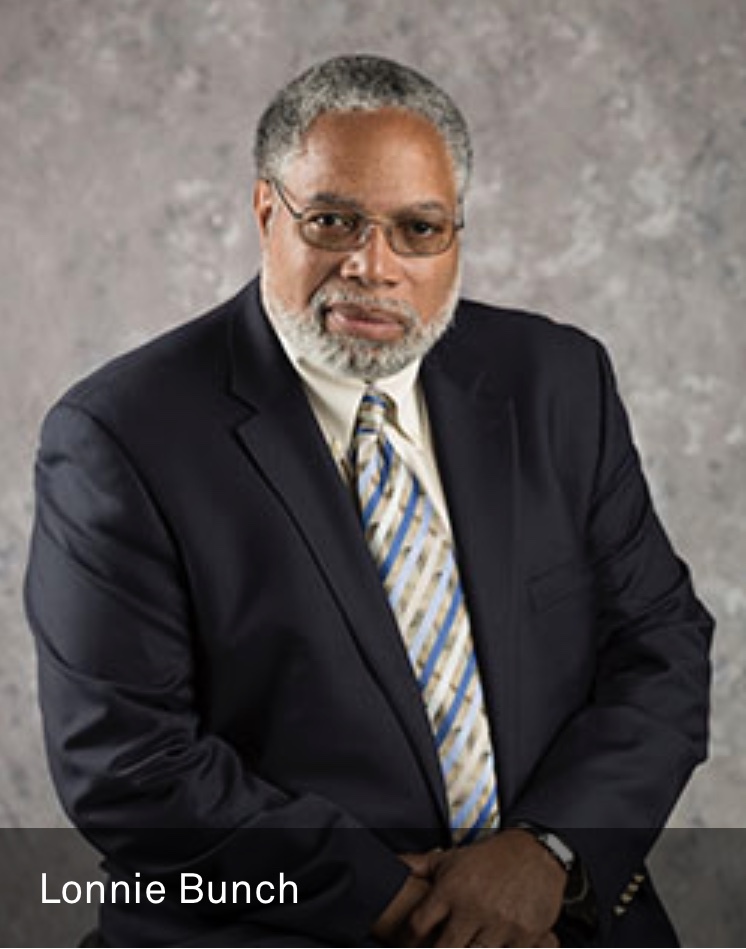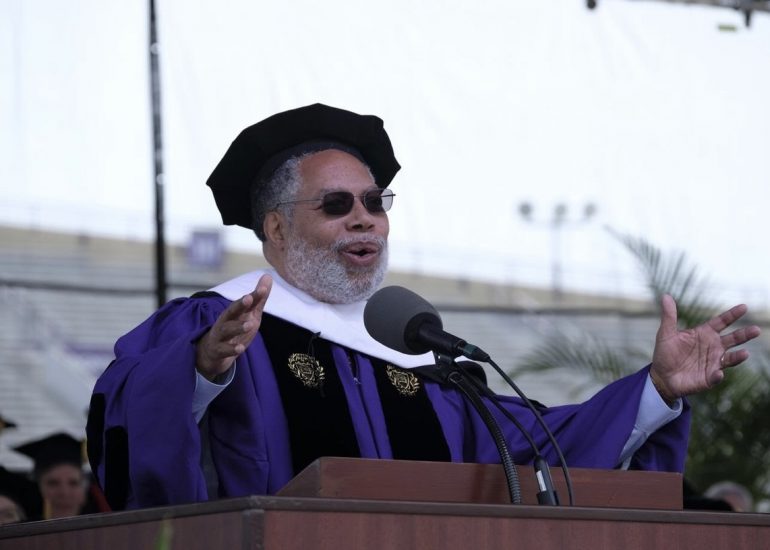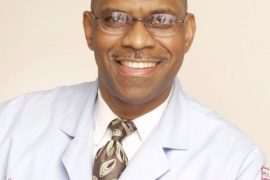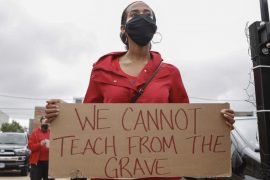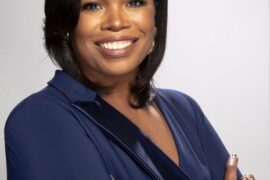Newly appointed head of the vaunted Smithsonian Institution and long-time Chicago favorite Lonnie Bunch returned to the city last week to deliver the commencement address to Northwestern University’s Class of 2019.
On June 16, 2019, Bunch became the 14th Secretary of the venerable Smithsonian Institution, the world’s largest museum, education, and research complex.
Under the Smithsonian umbrella, Bunch oversees 19 museums and the National Zoo, numerous research and cultural centers, and several education units, manned by more than 6,300 employees and almost 800 research fellows.
The Smithsonian draws more than 28 million public visits and 160 million website visits a year, while displaying 155 million museum objects and specimens and over two million library volumes.
Lonnie Bunch is the first African American, as well as the first historian, to lead the Smithsonian since its founding in 1846.
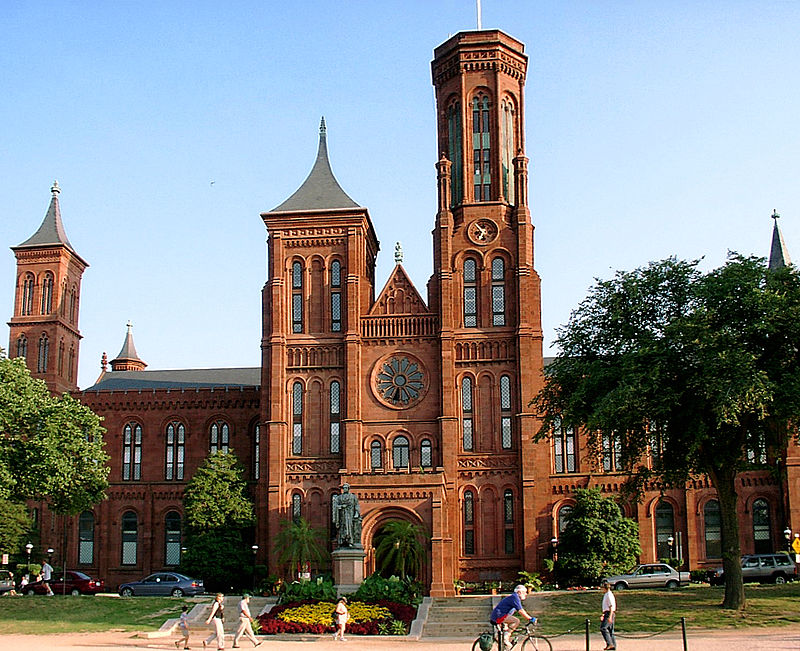
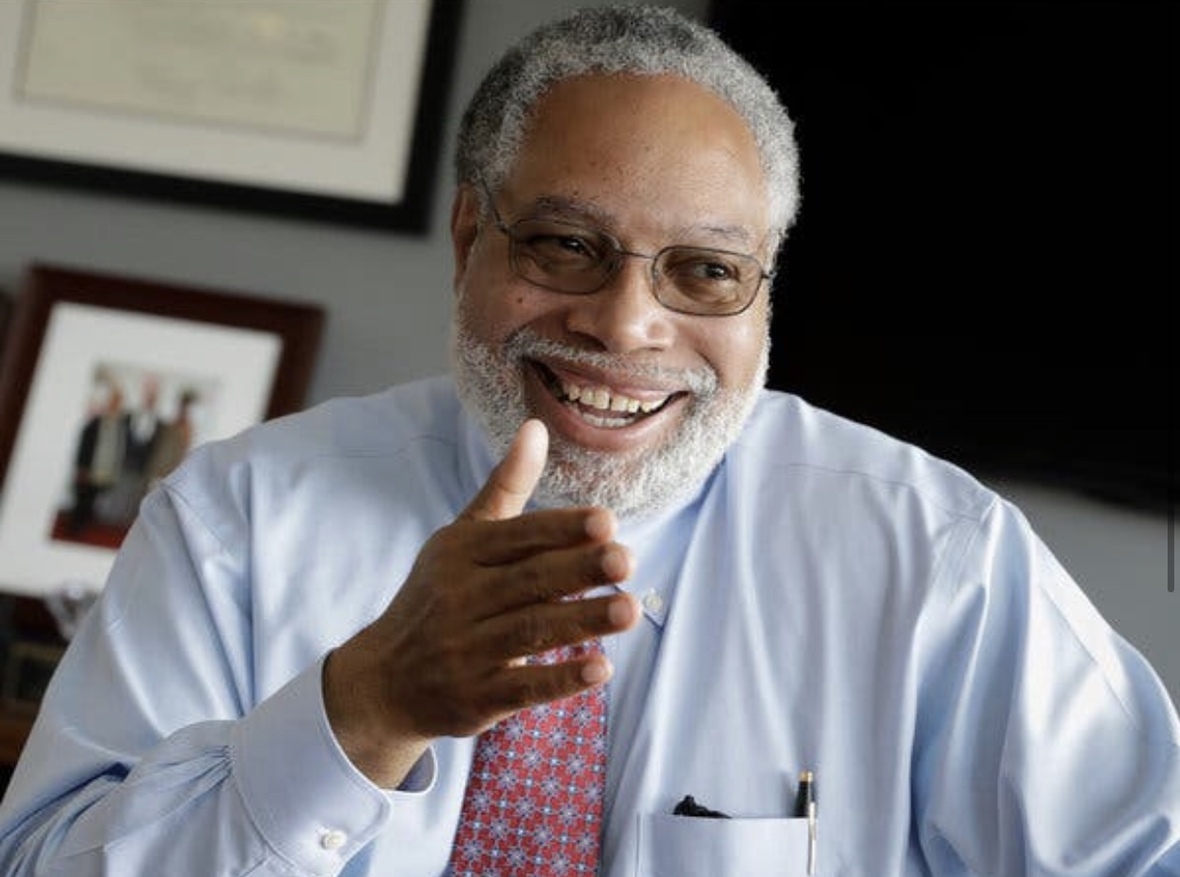
He was chosen for the position after his very successful work as founding director of the groundbreaking and newly minted National Museum of African-American History and Culture, which has become a cultural and tourist phenomenon for the Smithsonian.

Lonnie G. Bunch III, a 66-year-old New Jersey native, has spent most of his career as a history museum curator and administrator. He earned his bachelor’s (1974), master’s (1976), and doctorate (1979) degrees from American University in Washington, D.C.
Lonnie was well regarded here in Chicago when he served as president and director of the Chicago Historical Society (now known as the Chicago History Museum) from 2000 to 2005.
He was the first curator at the California African-American Museum in the 1980s, then did his first stint as a curator at the Smithsonian’s American History Museum, where in the 1990s, he rose to head of curatorial affairs.
I think that Lonnie Bunch is one of the most profound thought leaders in the country. His personal story is compelling and his career is stellar, which is why N’DIGO profiled him when he was at the Chicago Historical Society for a cover story in our December 2001 edition. His story was reprinted for inclusion in our coffee table/history book, N’DIGO Legacy: Black Luxe – 110 African-American Icons Of Contemporary History, which was published in 2017.
As Lonnie gave the commencement address at Northwestern University’s 161st graduation ceremony on June 21, he drew on stories from his own life and his once enslaved ancestors’ to challenge and encourage the graduating class.
His speech was inspiring and one for all to hear, and we are so glad that he presented a copy of it to N’DIGO so that we could share with all of you. Here are his comments on that day:
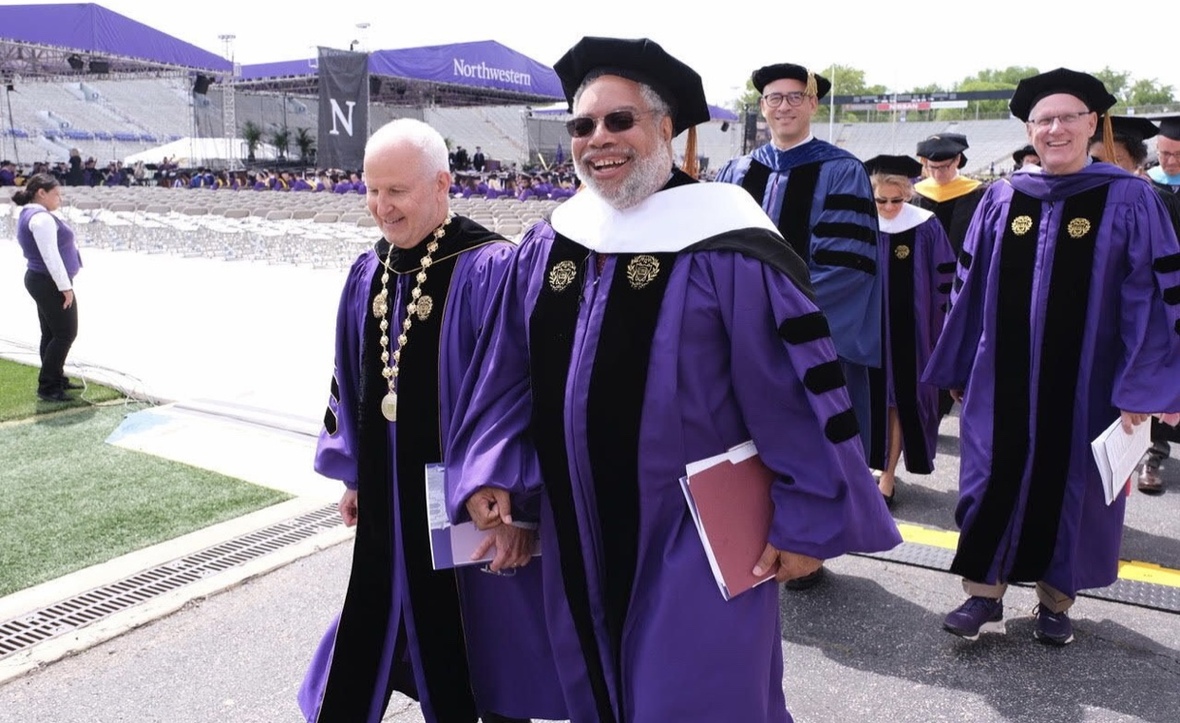

“Hello and congratulations to the Northwestern University Class of 2019!
Any commencement speaker would do well to note the words of Abraham Lincoln when he gave the Gettysburg Address. He said, “The world will little note nor long remember what we say here.”
Lincoln was right. We rarely remember what a commencement speaker says. But what I do hope you remember is, what you all learned here. What you accomplished here. And I hope more than anything else, that you will remember and cherish the relationships that were born here.
I am so honored and so humbled to be part of the commencement of Northwestern University. I envy you because you’ve had this wonderful opportunity to immerse yourself in a nurturing environment that is conducive to learning, but is also conducive to helping you find who you are. My youngest daughter said to me, “So why did they ask you to speak?”
I think in part I’m here because I want to ease the angst of many parents. I stand before you as a graduate of a liberal arts college with a degree in history…and I have a job!
But I am also pleased to be here because college, a college like this, has been essential to the transformation of my family.
My paternal grandparents were sharecroppers on the old Robertson plantation outside of Raleigh, North Carolina.
It was a plantation where their parents and their grandparents were enslaved for generations. For 27 years of their lives, my grandparents picked cotton, chopped peanuts, and planted corn.
But something inside them helped them to believe that despite the racial attitudes of the early 20th Century, their hands were suited for more than picking cotton or washing people’s clothing.
Thanks to a college like Northwestern, they were able to attend classes at night until they graduated 11 years later. Thanks to a college like this one, they were given a chance. And they never forgot the benefits of education, nor did they forget the promise of American life.
They not only remade themselves, but they remade and transformed our entire family. And I’m proud to say that my daughters have become the fourth generation of my family to graduate college.
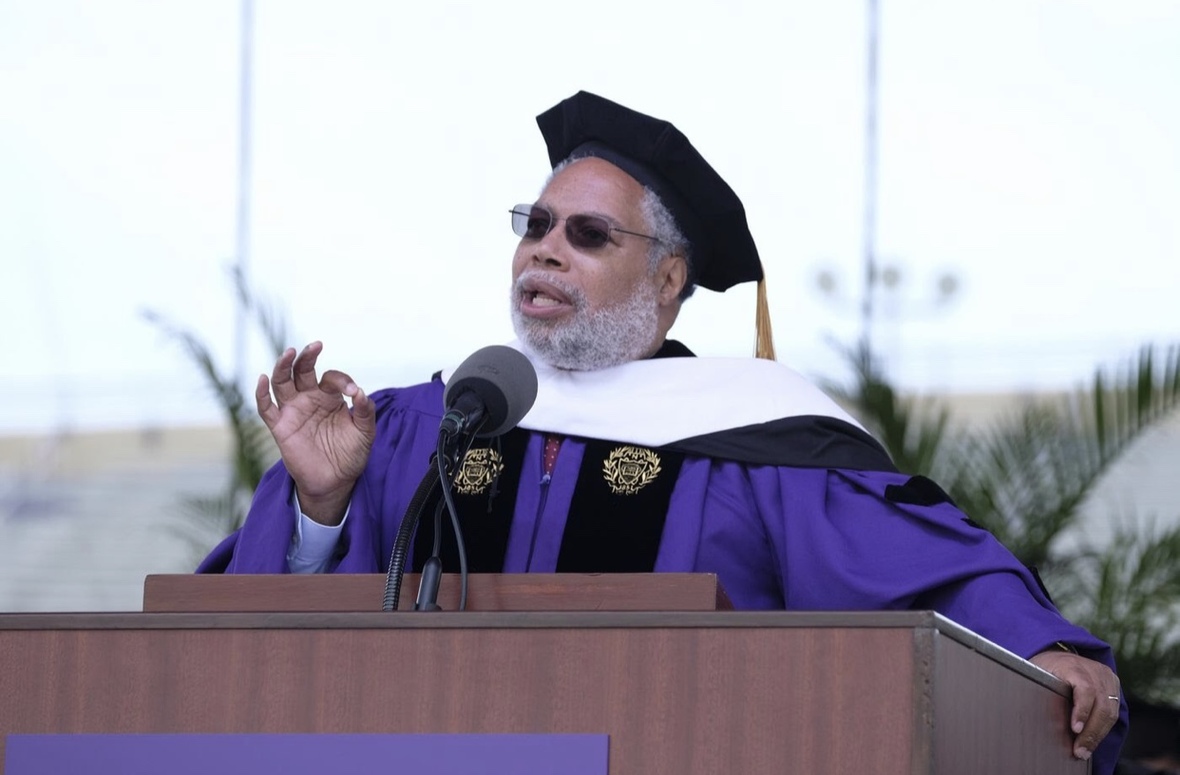
But this is more than a story about my family. It raises the issue of the power of the individual to affect change – the opportunity to have important impacts on one’s family and on the broader society.
One of the most important lessons I have learned is the need to think beyond yourself. To realize that as college educated adults, you should remember to fight the good fight. To remember that there is a greater good that transcends individual gain or personal achievement.
So I would argue that the burden, the challenge, for the Class of 2019 is to find your own good fight. To find ways to make America better. To realize that your skills, your creativity, and your educational achievements are needed to work for the greater good.
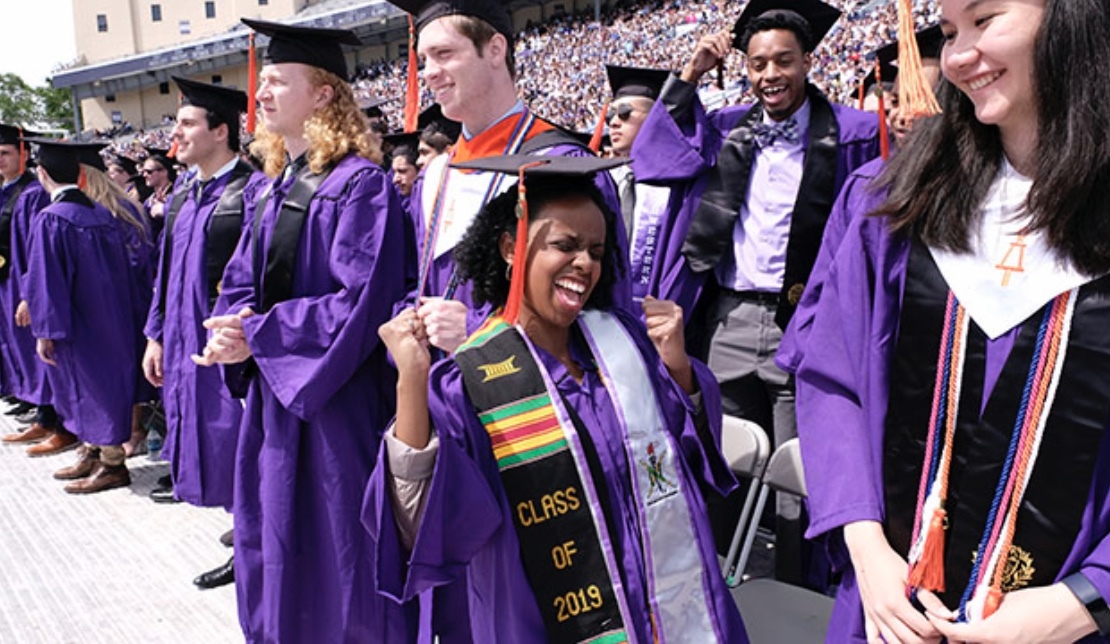
I am struck by something a dear friend of mine, Studs Terkel, the great oral historian from Chicago, once said. Near the end of his life, Studs, who never missed a picket, never missed a chance to struggle against the big guys, said to me, “You know Lonnie, I can’t hear anymore, can’t see much, can’t stand up, so all I ask you to do is point me in the direction where I can do good.”
That’s what I think you want to keep in mind. Always point yourself in the direction where you can do good.
Because as your life unfolds, as the years zip by, you’ll also have to learn how to embrace ambiguity and change. I always believed that once I graduated college, all the clouds would part, my future would be clear in front of me, and that calm certainty would be the lot of my life.
Wrong. Trust me when I tell you that your lives will unfold in dramatic and small ways that you could never conceive. I’ve learned that the only constant is change.
I could have never imagined that my career would take me from Washington to Massachusetts to California to Illinois and back to Washington. Or, as my youngest daughter says, “You just can’t keep a job, Dad.”
I could never imagine that I would be part of a team to build a national museum on the Washington Mall. A museum that allows us all to use African-American culture as a lens to understand what it means to be an American.
And I never could’ve imagined that I would be the 14th Secretary of the Smithsonian Institution! Reaching people with all the Smithsonian’s experts and resources in education, history, art, culture, and science is a once-in-a-lifetime opportunity.
It’s another chance to follow Studs’ example by doing good. But it’s also a challenge like none I’ve ever tackled. And that’s okay. Because that’s life.
You, too, will face surprising challenges and opportunities. You, too, will face disappointment and failure. You, too, will be wracked by the necessity of making difficult choices. And you, too, will be startled by the unexpected.
But it is crucial that you embrace, and in fact, revel in change. Because your lives will require a nimbleness that would have been unimaginable for your grandparents.
The third piece of advice I can give you is that no one is an island. At the risk of sounding like a bad 1970’s record, by that I mean that at times the challenges will seem too great to bear and you will need to draw support and sustenance from others.
This need to depend on others became clear to me at an event that I’ve rarely talked about before. I grew up in Belleville, New Jersey, where there were very few African Americans.
One day, I was in a part of town that I did not know. I was about 13 or 14. And I was attacked by a mob of white teenagers. They attacked me with bats and with rocks. I remember running from this taunting mob; I remember that I was terrified.
I ran until I could run no more, and I ran up a driveway and basically collapsed on the front lawn of a house I did not know. Just as the mob came up the driveway to basically inflict great pain, a little girl, a little blonde girl, came out of the house and said, “This is my house. This is my property. Get off this land.” She said it not to me, but to the mob.
She stood between me and the mob and rescued me. At that moment I learned much about how help comes from unlikely places. I learned about the generosity of spirit. I learned about race, and I learned about goodwill.
I will never forget what she did – though I have never seen her again in my life. The incident changed me, because not only did it stimulate my interest in history – to help me understand why race mattered – but it taught me never to generalize, never to pigeonhole people based on generalizations.
So no matter how fast one runs or how smart one is, there will be many times when we need to draw that sustenance, inspiration, and guidance from others. It is crucial that that well of sustenance that you can draw from comes from many of the people you have met here.
That support, that inspiration, comes from the faculty, the staff, and the students that you’ve encountered here at Northwestern. It is true that the friends that you made here and the professors that you have learned from will be with you in person and in spirit the rest of your lives.
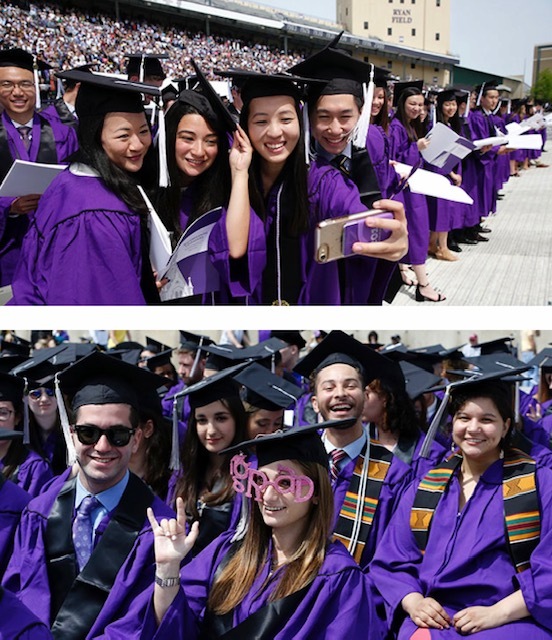
Do not be afraid to reach out or reflect on your time here. Because this is the experience that will help you navigate even the most difficult of times in your life.
Every family has a story of hard work, of resiliency, of love, of luck that can inspire and support, if only we look inside. But for me, that inspiration also comes from the power of history. That is what I learned at college – the importance of history.
I learned to draw inspiration from the Irish immigrant who left all that she knew to take a chance for a better life in America. I learned from college to draw inspiration from that enslaved African who refused to let the field break her and who found ways to preserve her family, her humanity, and her humor.
I learned from college to be in awe of the industrial worker who spent years on the assembly line so that his children would not have to. And I learned to be moved by the people who braved fire hoses and dogs in order to demand simple justice during the Civil Rights Movement.
It is because of the education that I received in college – and that you have received here – that I know you are ready to face the challenges of the rapidly changing world outside of this campus.
So let me end as I began – by congratulating this wonderful Class of 2019.
With your diploma comes the responsibility to use your skills, to use your creativity, to use your education, to live a good life…and to contribute to making America even better.
But you also have the responsibility to acknowledge and revel in this day. To enjoy what you’ve accomplished. Because you have worked hard. And you have changed. And you are ready for the challenges and opportunities that stand before you!
So I wish you a life of joy, a life of peace, a life of surprise, a life of important work, and a life of wonder.
Enjoy the ride!”
